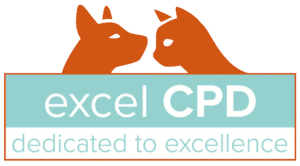october, 2024

Course Details
In recent years there has been a marked interest in identifying the causes of gastrointestinal disease in companion animals; the path to diagnosis has progressed with the identification
Course Details
In recent years there has been a marked interest in identifying the causes of gastrointestinal disease in companion animals; the path to diagnosis has progressed with the identification of serological biomarkers and more access to endoscopy within general practice. Novel protein diets have been developed by veterinary food companies resulting in a positive effect on outcome in combination with pharmaceuticals for some animals.
The veterinary nurse plays a key role investigation, treatment and client support for these often, chronic cases. Having an enhanced level of knowledge on the pathophysiology and treatment options, together with a firm understanding of the diagnostic process is paramount to patient recovery.
After completing this 6 week online course, the participants will have a greater knowledge and understanding of the basic principles of gastrointestinal disease which they can apply regularly in practice.
Week 1
Diseases of the Upper Gastrointestinal Tract
Upper gastrointestinal tract (UGIT) anatomy refresher
UGIT hereditary and acquired abnormalities
Investigation of vomiting and regurgitation
Sedation and general anaesthesia considerations
Learning objectives
After completion of this week, participants should be able to:
List the main structures of the UGIT
Describe the normal function and processes of the UGIT
Identify the difference between vomiting and regurgitation and the common causes
Understand the diagnostic approach to patients with UGIT symptoms
Explain the reasons why patients with UGIT disease are higher risk for investigative procedures
Evaluate current methods used in practice to sedate patients with UGIT disease and analyse if modifications to practice would be beneficial
Week 2
Diseases of the Lower Gastrointestinal Tract
Lower gastrointestinal tract (LGIT) anatomy refresher
LGIT pathophysiology
Mechanisms and classification of diarrhoea
Investigative process for LGIT symptoms
Patient preparation for GI endoscopy
Supportive treatment for patients with LGIT
Learning objectives
After completion of this week, participants should be able to:
List the main structures of the LGIT
Describe the normal function and processes of the LGIT
Differentiate diarrhoea types and common causes
Understand the diagnostic approach to patients with LGIT symptoms
Evaluate current care plans used in practice to prepare patients for endoscopy and analyse if modifications to practice would be beneficial
Summarise the key therapeutic treatments for patients with LGIT
Week 3
Gastrointestinal Endoscopy
Anatomy and functions of the gastroscope
Cleaning and sterilising procedures
Endoscopy sourcing, storage, and auditing
Learning objectives
After completion of this week, participants should be able to:
Label the main components and list the functions of a gastroscope
Explain the bedside procedure for cleaning and then sterilising the gastroscope
Select the correct biopsy tools and materials for optimal sampling and histological value
Evaluate practice protocols to standardise in line with current best practice
Week 4
Interventional Endoscopy
Foreign body removal
Balloon dilatation
Injection of steroids and anti-inflammatory medications
Endoscopically placed feeding tubes
Learning objectives
After completion of this week, participants should be able to:
List the various interventional uses of gastrointestinal endoscopy
Select the correct forcep tool for foreign body retrieval
Describe the ballooning technique use for oesophageal strictures
Explain the indications, risks and technique for placing a PEG tube
Week 5
Nursing Patients with Gastrointestinal Disease
Nursing basics and care plans
Pain and emesis management
Oesophageal tube placement
Assisted feeding methods
Learning objectives
After completion of this week, participants should be able to:
List the essential care requirements for nursing patients with GI disease
Identify symptoms of pain and nausea
Compare patient assessment tools to monitor status and benchmark interventional treatment
Calculate energy requirements and feeding volumes for tube feeds
Week 6
Enteropathy Therapeutics and Nutrition
Terminology of diseases
Pathways and mechanisms of enteropathies
Medications and therapies
EBVM current information
Dietary needs
Learning objectives
After completion of this week, participants should be able to:
Differentiate between terms associated with chronic enteropathies
Analyse the treatments allocated to different types of enteropathy
Refer to updated resources and guidelines to further inform their knowledge and subsequently refer to it at a later date
Explain what a diet trial is
List the types of dietary allergen there are
The course will be fully tutored by Nicola Read and Gina Parkes and will consist of 15 hours of CPD given in various formats, including tutorials, tasks, case scenarios, forum discussions and quizzes. This course is tutored for 6 weeks, followed by a two week extension of untutored ‘catch up’ time, before the course officially ends.
All delegates will then have unlimited lifetime access to the learning material for future reference
Time
October 21 (Monday) - November 29 (Friday)
Location
Online
Speakers for this event
-
Gina Parkes
Gina Parkes
DipAVN(Small Animal), AFHEA, RVN
DipAVN(Small Animal), AFHEA, RVN
-
Nicola Read
Nicola Read
PgC (Oncology Veterinary Nursing), DipAVN (Med), RVN
Nicola qualified in 2000 from a well established small animal general practice in North West London where she also gained the D32/33 Assessor qualification. She spent a year at Battersea Dogs and Cats Home in 2001 to gain experience in a charity based organisation and then moved to the Queen Mother Hospital, Royal Veterinary College in 2002, in order to study for the RCVS advanced diploma. In June 2008 she became the Head Medicine Nurse at the Royal Veterinary College and is currently working towards the American Internal Medicine Veterinary Technicians Certificate. Her clinical interests are endocrinology, gastroenterology, oncology and immune-mediated disease.
PgC (Oncology Veterinary Nursing), DipAV...


0 Comments